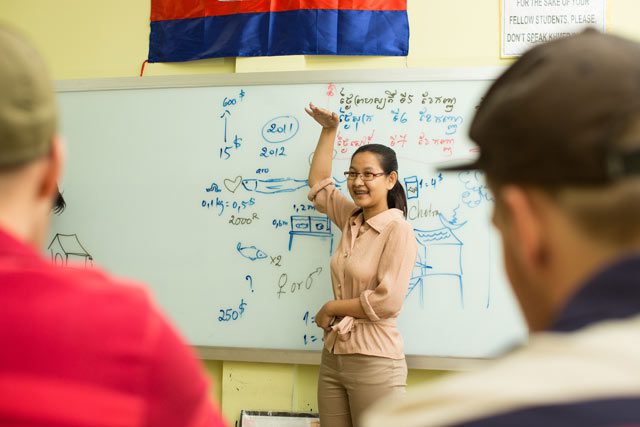Two maps, one of Europe and the other of Cambodia, flank a whiteboard in a Phnom Penh classroom. Between them are two young Khmer teachers who, in a flurry of hand gestures and animated chatter, pretend to swim from one continent to the other. Sat in a semi-circle and listening intently to the teachers are 12 students – adult foreigners – from a range of different cultures. A sign on the wall, written in both English and Khmer, reads: “For the benefit of fellow students, please don’t speak Khmer during class.”
The students, laughing along with their teachers, are part of an Automatic Language Growth (ALG) class at the Language Institute of Natural Khmer (Link), the first school in Cambodia to employ the listening-based learning method. Throughout the lesson the teachers talk and act out scenes – going to the market, driving a motorbike, watching TV – that someone fluent in Khmer might discuss on a day-to-day basis. While instruction is given only in Khmer, if a student has a question – which is not encouraged – it must be asked in English, and responded to in Khmer. A combination of speech, props, body language and repetition is the basis from which ALG aims to equip its students with native-like fluency in a foreign language.
Note-taking is also discouraged, while homework and exams are strictly forbidden. Progression from a beginner through to an advanced level comes only when a student feels ready to proceed.
David Jacobs, 26, is the director of Link, which opened in Phnom Penh in May of last year. He has learnt both Thai and Khmer using the ALG process. Also fluent in five other languages, including Vietnamese, which he learnt the traditional way, he says he has found ALG the best way to learn a foreign language – and learn it correctly.
“Using this method, you don’t really think about the different difficulties [between languages],” Jacobs explains. “People say that with Thai, the main difficulty is the different tones, and in Cambodia it’s the pronunciation of vowels. But when you use this method you don’t think about it, it just comes naturally.”
This is where ALG can offer a more arresting means by which to learn a language. Its premise is natural language acquisition that, in theory, results in native-like fluency and even native-like brain function. Gone would be the urge to compare English vowels with Khmer ones. Rather, a student’s brain learns sounds from scratch. The same is true for words – where translation no longer exists, the language can simply be.

“There are vowels in Khmer that don’t exist in any Western language. But it’s not just vowels – it’s sounds. It’s the way you move your mouth and your tongue when you say things. They are sounds that [for us] don’t exist or that we’re not accustomed to,” says Jacobs.
The methodology, invented by American Dr J. Marvin Brown in Thailand, is based on two other methods: the Natural Way and the Silent Way. The former is named as such due to its students learning language naturally, in the same way that children learn to speak their native tongue. Toddlers don’t take notes or ask their parents to explain the principles of language, yet they learn to speak fluently.
The latter ‘silent’ method is based upon the period from when a baby is born until he or she starts speaking, at about two years of age. Brown estimated that, after eliminating the time it spends sleeping, a baby engages with language for about 800 hours before uttering its first words. As such, students of the silent and ALG methods are instructed to talk only when they are ready. Speaking too soon, Brown claimed, causes students to say words incorrectly. The technical linguistic term for this is ‘fossilisation’ – say something wrong enough times and it will become a permanent error, which is almost impossible to undo.
Brown first launched the ALG method in Bangkok in 1984 at AUA Language Centre, a school established by American linguists. Today, the school is headed by David Long, 52, who has been with the organisation since 1996, when he enrolled as a student. He says that Brown’s drive in creating ALG was to go beyond traditional and ineffective language instruction.
“His goal had always been to find a way for an adult to become native in their second language,” Long says, referencing the work of James Asher and Stephen Krashen as influencing the birth of what was once known as Brown’s Natural Approach.
It is people who are after this kind of in-depth knowledge of a second language that thrive in the ALG environment.
“The people who attend AUA as students are people who want to settle in Thailand and spend the rest of their lives there,” says Jacobs. “But in Cambodia, we don’t really have that crowd yet. Here, people are usually in the country for a determined period of time so don’t have the time or desire to learn Khmer.”
There are, of course, exceptions to that rule, and a number of them have found their way to Link.
Alex Read, 33, is a British expat who has been living in Cambodia for four years and has been learning the local language to aid in his career. He says he tried a number of different Khmer classes before finding a fulfilling match in ALG.
“I was a bit sceptical about the method, especially the requirement to not speak, but I found the classes helped me immerse myself in the language, and they began to make me think in Khmer, rather than thinking about the English meaning of words,” Read says.
While there is a plethora of reasons why students throw in the towel on their language studies, including time and cost, boredom, says Jacobs, is also a big contributor. In Cambodia, the most commonly used book in teaching Khmer is Modern Spoken Cambodian – a dense, dull-looking book, originally published way back in 1970.
“The content is pre-Khmer Rouge, focusing on life and concepts in a way that is incomprehensible to anyone living in present-day Cambodia,” says Jacobs.
The opposite is true of ALG, which does not utilise ‘qualified’ language teachers; instead hiring dynamic individuals who are keen to share things about their lives with students wanting to learn their language.
“The variety of teachers means you don’t get bored, and after a few months it felt more like talking to friends than studying in a class,” says Read.
Long says that the expansion of ALG into other Southeast Asian countries would likely be a slow one, largely due to scepticism. However, if babies can do it, then it might just catch on.

